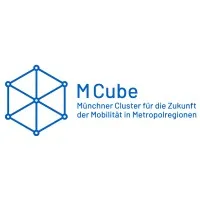MCube


The MCube: "Munich Cluster for the Future of Mobility in Metropolitan Regions" aims to establish Munich as a pioneer in sustainable and transformative mobility innovations, with a particular focus on the relationship between urban and rural areas. The cluster's mission is to align mobility innovations with societal challenges, and it aims to contribute to three missions in the Munich metropolitan region: improving the quality of time, space, and air.
MCube brings together a unique network of actors from the Munich region, as well as science, industry, government, and society, to develop sustainable solutions for mobility in metropolitan regions. Through interdisciplinary collaboration, the cluster seeks to drive innovation and create scalable solutions with model character, addressing global challenges and making a positive impact on society.
DatSim
Whithin the framework of MCube the DatSim project aims to develop a simulation model to represent, among other, the measures and solutions developed by the rest of projects of MCube, including a variety of innovations such as autonomous fleets for passenger transport or autonomous delivery of goods.
The role of the Professorship of Travel Behavior is to provide the simulation framework where different scenarios can be simulated and where new submodels can be plugged in. Durign the project, the transport model MITO will be further developed and converted into an activity-based model.
The project DatSim will create the DatenHub, a database where different kinds of transport data, including model inputs and outputs can be stored and shared. Further details about the project can be found in the project website.
Contact: Wei-Chieh Huang
InterLog
The project takes an interdisciplinary approach to develop, test, and evaluate sustainable and flexible logistics concepts for avoiding and shifting inner-city delivery traffic. To achieve this goal, the approach includes (i) testing and designing flexible distribution structures on the last and penultimate mile, (ii) complementary technology development, particularly for micro-consolidation centers, electric and low-emission vehicle concepts, and modular transport containers, and (iii) testing the developed concepts in real-world laboratories and field trials. The Professorship of Travel Behavior will among others support the installation of a living lab on urban frieght transport and work on the Freight Transport Model FOCA. Further details can be found in the project website.
Contact: Matthias Langer